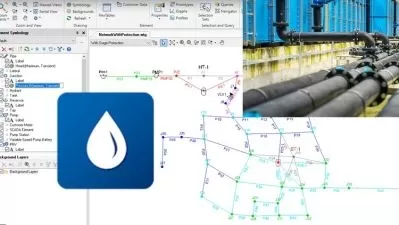Introduction to Fluid Mechanics
Baskar P
1:59:53
Description
Learn Fluid Properties, Fluid Statics, Dynamics, Flow Thro' Pipes, Dimensional Analysis and more-For Aspiring Engineers
What You'll Learn?
- Learn fundamentals of Fluid Mechanics and its applications.
- Understand various fluid properties such as density, specific weight, viscosity, and so on.
- Estimate the power lost due to friction in bearings and sleeves.
- Determine the velocity and acceleration of fluid at various point in a flow field.
- Calculate the pressure and center of pressure on plane and curved surfaces.
- Determine the pressure drop between two points in a pipe flow.
- Derive a governing equation between different physical variables.
Who is this for?
What You Need to Know?
More details
DescriptionWhat is Fluid Mechanics?
Fluid Mechanics is a branch of science that deals with fluids at rest and in motion.
How will this course help me in my studies and career?
Fluid Mechanics is one of the core subjects in the field of engineering and technology. Literally speaking, without the concept of Fluid Mechanics, there is no life in the world.
This subject plays a vital role in everything from agriculture to aviation. This is an important core subject for science and engineering students at the Diploma, and Degree level for various streams like Aeronautical, Automobile, Biotechnology, Chemical, Civil, Electrical, Mechanical, and so on worldwide.
This course will teach you how the fluid properties affect one another, and how the forces act on the containing bodies. Also, you will learn how the fluids flow in a pipe or channel and how much energy is lost during the flow. This course is the core foundation for the design of pumps, turbines, dams, biomedical devices, cryogenic equipment, and so on.
At the end of the course, you will be able to draw out the important information from the descriptive real-world problems and perform mathematical modeling and calculation to obtain the optimum solution. This is what you call a problem-solving ability. Also, you will be able to apply the concepts to other areas of engineering applications. In other words, you will be able to utilize the skills and knowledge gained from this course in advanced-level subjects like Design of Hydraulic Structures and Machines, Biomedical Devices, Design of Thermal Systems, and so on.
Who this course is for:
- Beginners who want to gain better understanding of Fluid Mechanics.
- Diploma and Degree level Engineering students.
- Practicing Engineers who want to refresh their knowledge on Fluid Mechanics.
What is Fluid Mechanics?
Fluid Mechanics is a branch of science that deals with fluids at rest and in motion.
How will this course help me in my studies and career?
Fluid Mechanics is one of the core subjects in the field of engineering and technology. Literally speaking, without the concept of Fluid Mechanics, there is no life in the world.
This subject plays a vital role in everything from agriculture to aviation. This is an important core subject for science and engineering students at the Diploma, and Degree level for various streams like Aeronautical, Automobile, Biotechnology, Chemical, Civil, Electrical, Mechanical, and so on worldwide.
This course will teach you how the fluid properties affect one another, and how the forces act on the containing bodies. Also, you will learn how the fluids flow in a pipe or channel and how much energy is lost during the flow. This course is the core foundation for the design of pumps, turbines, dams, biomedical devices, cryogenic equipment, and so on.
At the end of the course, you will be able to draw out the important information from the descriptive real-world problems and perform mathematical modeling and calculation to obtain the optimum solution. This is what you call a problem-solving ability. Also, you will be able to apply the concepts to other areas of engineering applications. In other words, you will be able to utilize the skills and knowledge gained from this course in advanced-level subjects like Design of Hydraulic Structures and Machines, Biomedical Devices, Design of Thermal Systems, and so on.
Who this course is for:
- Beginners who want to gain better understanding of Fluid Mechanics.
- Diploma and Degree level Engineering students.
- Practicing Engineers who want to refresh their knowledge on Fluid Mechanics.
User Reviews
Rating
Baskar P
Instructor's Courses
Udemy
View courses Udemy- language english
- Training sessions 22
- duration 1:59:53
- Release Date 2023/10/04

















